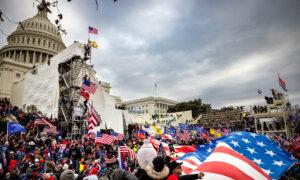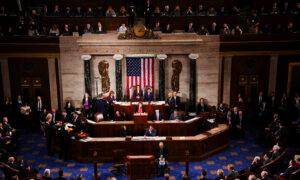President-elect Donald Trump has pledged pardons for non-violent defendants, saying they would be granted on an individual basis.
More than 1,500 people have been charged and approximately 1,009 have pled guilty to charges related to the events of Jan. 6, 2021, the Department of Justice (DOJ) said.
The U.S. Attorney for the District of Columbia provided the four-year update, outlining how the department has pursued and adjudicated various charges.
“On this day, four years ago, police officers were brutally assaulted while bravely defending the United States Capitol,” he said. “They were punched, tackled, tased, and attacked with chemical agents that burned their eyes and skin.”
Some 180 were charged with entering a restricted area with a dangerous or deadly weapon, while “approximately 174 defendants” faced charges of using a deadly or dangerous weapon. That figure includes defendants who were charged with causing serious bodily injury to an officer.
According to DOJ, approximately 1,100 defendants have had their cases fully adjudicated and received sentences while 221 individuals have been found guilty at contested trials in Washington, including 10 who were found guilty of seditious conspiracy.
Trump and his staff have indicated that he would pardon at least some defendants. In December, Time magazine asked Trump whether he would pardon all defendants.
“I’m going to do case-by-case, and if they were non-violent, I think they’ve been greatly punished,” he said. “And the answer is I will be doing that, yeah, I’m going to look if there’s some that really were out of control.”
He said that the pardon process would “start in the first hour that I get into office.”
“A vast majority should not be in jail, and they’ve suffered gravely,” Trump said.
So far, 667 people have been sentenced to periods of incarceration.
The controversy over Jan. 6 reached the Supreme Court in April 2024, when the justices heard defendants’ arguments that the DOJ had misapplied an obstruction statute to their conduct.
The DOJ said on Jan. 6, 2025, that every person charged under Section 1512 was also charged with something else and would continue to face criminal exposure even if that charge were dropped.
Of approximately 259 who were charged under that law, approximately 126 had their cases still pending in D.C. District Court when the Supreme Court issued its decision in Fischer, according to the DOJ.
The DOJ decided to forgo the charge for approximately 119 of those defendants, and it didn’t oppose vacating or dismissing the charge in approximately 65 of the cases that were adjudicated by the time Fischer was decided.
Approximately 68 individuals were charged with theft of government property while approximately 91 were charged with destruction of property and all of the defendants were charged with some form of trespass or disorderly conduct. Approximately 18 defendants were charged with seditious conspiracy.
The U.S. Court of Appeals for the D.C. Circuit held that the DOJ could apply a trespassing law without proving that a Jan. 6 defendant was aware that former Vice President Mike Pence’s presence on the Capitol grounds was the reason for restricting that area.
Original News Source Link – Epoch Times
Running For Office? Conservative Campaign Consulting – Election Day Strategies!


